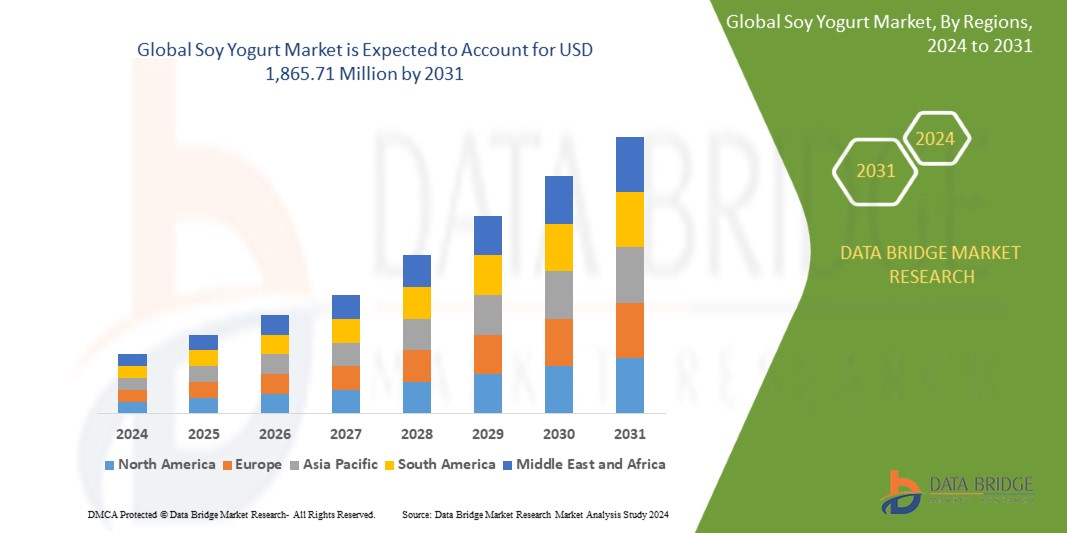The soy yogurt market has experienced significant growth in recent years, driven by increasing consumer demand for plant-based alternatives to 1 dairy products. Soy yogurt offers a nutritious and versatile option for individuals who are lactose intolerant, vegan, or simply seeking a healthier alternative to traditional dairy yogurt.
Data Bridge Market Research analyses that the global soy yogurt market, which was USD 589.10 million in 2023, is expected to reach USD 1,865.71 million by 2031, growing at a CAGR of 15.5% during the forecast period of 2024 to 2031. In addition to the insights on market scenarios such as market value, growth rate, segmentation, geographical coverage, and major players, the market reports curated by the Data Bridge Market Research also include in-depth expert analysis, geographically represented company-wise production and capacity, network layouts of distributors and partners, detailed and updated price trend analysis and deficit analysis of supply chain and demand.
For more information, visit https://www.databridgemarketresearch.com/reports/global-soy-yogurt-market
Market Size and Growth
The global soy yogurt market is estimated to be worth billions of dollars, with a significant portion of the growth coming from developed and emerging economies. The increasing awareness of the health benefits of soy, coupled with the growing popularity of plant-based diets, has fueled the expansion of the market.
Market Share
Several key players dominate the soy yogurt market, including established dairy companies, specialized plant-based food manufacturers, and innovative food startups. These companies offer a wide range of soy yogurt products, catering to different dietary needs and taste preferences. However, newer entrants and niche brands are also making significant strides, challenging the traditional market leaders.
Market Opportunities
The soy yogurt market presents numerous opportunities for businesses and investors. Some of the key areas of growth include:
- Product Innovation: The development of innovative soy yogurt products, such as flavored yogurt, Greek-style yogurt, and probiotic yogurt.
- Functional Foods: The incorporation of functional ingredients, such as probiotics, omega-3 fatty acids, and vitamins, into soy yogurt.
- Sustainable Sourcing: The use of sustainably sourced soybeans to reduce the environmental impact of soy production.
- Emerging Markets: The expansion of the soy yogurt market into emerging economies with growing consumer demand for plant-based alternatives.
- Online Sales: The growth of online sales channels for soy yogurt, providing convenient access to consumers.
Market Challenges
Despite its growth potential, the soy yogurt market faces several challenges:
- Consumer Perception: Overcoming negative perceptions about soy products, such as concerns about phytoestrogens.
- Competition from Other Plant-Based Alternatives: Competition from other plant-based milk alternatives, such as almond milk and oat milk, can impact the demand for soy yogurt.
- Price Sensitivity: Price sensitivity among consumers can limit the adoption of premium soy yogurt products.
- Regulatory Hurdles: Compliance with food safety and labeling regulations can be complex.
- Supply Chain Challenges: Ensuring a reliable supply of high-quality soybeans can be challenging, especially in the face of climate change and other factors.
Market Demand and Trends
The demand for soy yogurt is driven by a variety of factors, including:
- Health Benefits: The nutritional benefits of soy, including protein, fiber, and essential vitamins and minerals.
- Lactose Intolerance: A suitable alternative for individuals with lactose intolerance.
- Vegan and Vegetarian Diets: A popular choice for vegans and vegetarians.
- Environmental Concerns: The desire for sustainable and environmentally friendly food choices.
- Changing Consumer Preferences: The growing preference for plant-based and healthier food options.
Some of the key trends in the soy yogurt market include:
- Product Innovation: The development of new and innovative soy yogurt products, such as flavored yogurt, Greek-style yogurt, and dairy-free yogurt alternatives.
- Sustainability: The focus on sustainable sourcing and production practices.
- Clean Label: The increasing demand for products with simple, recognizable ingredients.
- Functional Foods: The incorporation of functional ingredients to enhance the health benefits of soy yogurt.
- E-commerce: The growth of online sales channels for soy yogurt.
In conclusion, the soy yogurt market is a dynamic and growing industry with significant potential to meet the evolving needs of consumers. By addressing the challenges and capitalizing on the opportunities, businesses can contribute to the development of innovative and sustainable soy yogurt products that cater to a diverse range of consumers.
